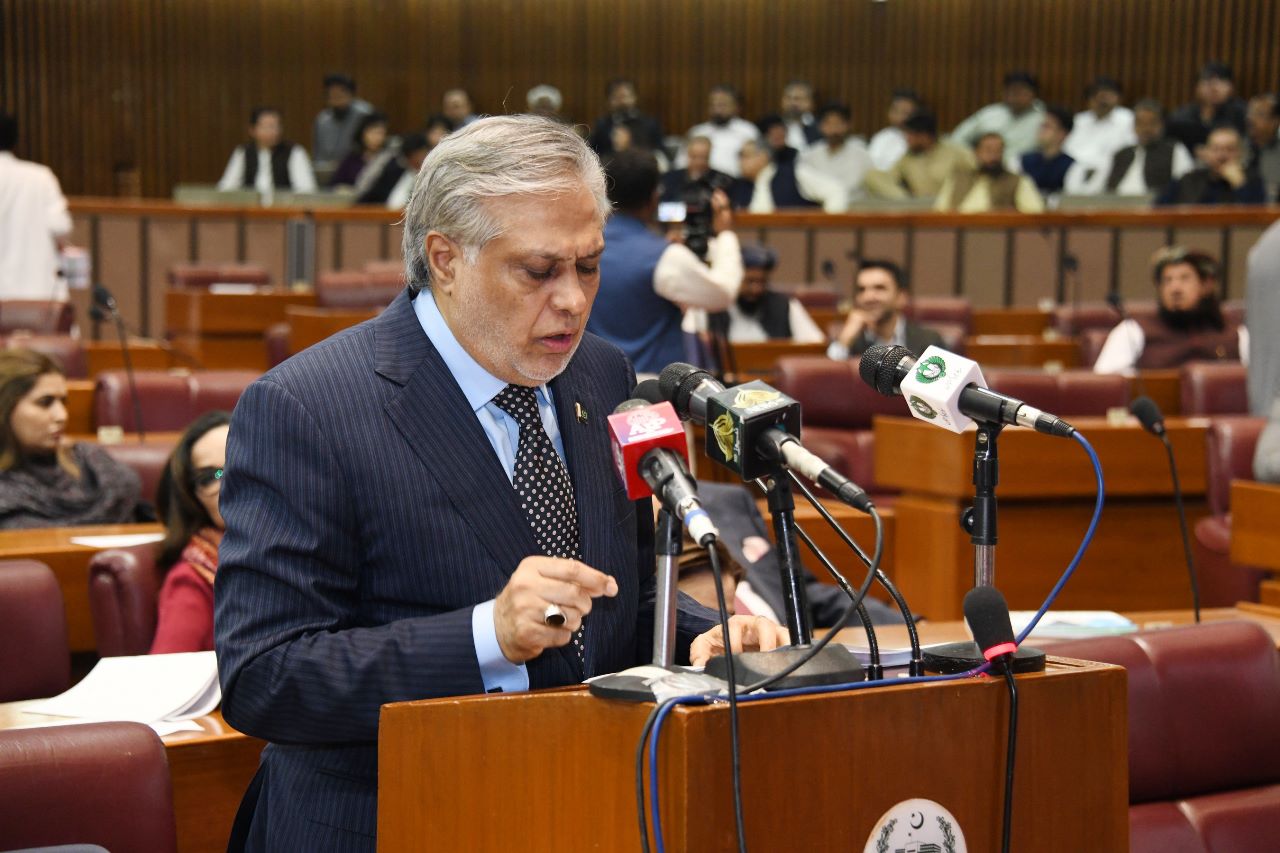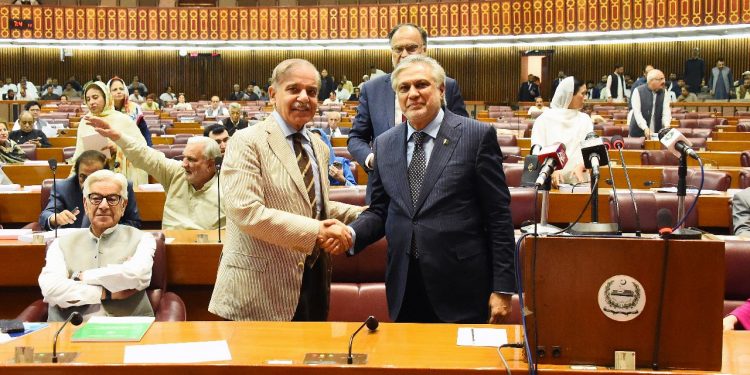Pakistan’s Finance Minister, Ishaq Dar, presented the country’s federal budget for the fiscal year 2023-24 on 9 June 2023. The budget, valued at Rs14.46 trillion, focuses on avoiding new taxes and projected a 3.5 per cent economic growth rate. To secure additional bailout funds from the International Monetary Fund (IMF), Pakistan has shared its budget numbers with the lender, stating its compliance with the program’s requirements. Pakistan is facing enormous economic challenges as a result of the dismal governance of the previous ruling party, the Pakistan Tehreek-e-Insaf (PTI). Despite these challenges, the current coalition government has taken measures to rescue the economy from default, leading to improved fiscal conditions.
In his budget speech, the finance minister emphasised that the budget should be viewed as a responsible budget rather than an election-oriented one. This indicates the government’s commitment to addressing economic issues and making sustainable policy decisions.
Several tax exemptions and incentives have been introduced to promote specific sectors, including agro-based industries, IT exports, and the printing of the Holy Quran. These measures are designed to encourage investment, job creation, and economic growth.
The budget ensures that there will be no rise in duties on the import of essential items, aiming to provide relief to the masses.
This article examines the key highlights of the budget and its implications for Pakistan’s economy.

The budget ensures that there will be no rise in duties on the import of essential items, aiming to provide relief to the masses.
Economic growth target: The government aims to achieve a growth rate of 3.5 per cent in the coming fiscal year. This target reflects the government’s focus on revitalising the economy and fostering economic expansion.
Inflation target: The inflation target has been set at 21 per cent, indicating the government’s awareness of the prevailing inflationary pressures and its intention to control them.
Pension increase: Retired federal government employees will receive a flat increase of 17.5 per cent in their pensions. This adjustment aims to address the impact of inflation on the living standards of retired individuals.
Ad-hoc relief allowance: Federal government employees in grades 1-16 will receive a significant 35 per cent increase in the ad-hoc relief allowance, while those in grades 17-22 will see a 30 per cent increase. This measure aims to improve the financial well-being of government employees.
Tax on bonus shares: A flat 10 per cent tax has been imposed on the issuance of bonus shares of listed companies. This measure is intended to generate revenue for the government through the taxation of corporate profits.
Cash withdrawal tax: The government has reintroduced withholding tax on cash withdrawals by non-filers of income tax returns. This measure aims to broaden the tax base and encourage individuals to file their tax returns.
Health insurance card: The government plans to issue health insurance cards to working journalists and artists, providing them with access to healthcare services. This initiative would support these professionals and promote their well-being.
Public Sector Development Programme (PSDP) allocation: The PSDP has been set at Rs1,150 billion, including Rs200 billion for public-private partnerships. The PSDP allocation focuses on completing partially finished projects, attracting foreign direct investment, and promoting balanced growth among cities. Special attention will be given to projects in Balochistan.
 Exports and remittances targets: The government aims to achieve exports of $30 billion and remittances of $33 billion in the coming fiscal year. These targets indicate the government’s focus on boosting the country’s foreign exchange reserves. The budget proposes steps to promote remittances through formal channels, such as abolishing the 2 per cent final tax on the purchase of immovable property. A “diamond card” is also introduced for individuals sending over $50,000, offering various privileges and incentives.
Exports and remittances targets: The government aims to achieve exports of $30 billion and remittances of $33 billion in the coming fiscal year. These targets indicate the government’s focus on boosting the country’s foreign exchange reserves. The budget proposes steps to promote remittances through formal channels, such as abolishing the 2 per cent final tax on the purchase of immovable property. A “diamond card” is also introduced for individuals sending over $50,000, offering various privileges and incentives.
Duty exemption on solar panel and battery raw materials: Customs duty on the import of raw materials used for solar panels and batteries has been removed. This measure will promote the use of renewable energy and support the growth of the solar industry.
Tax exemption for real estate investment trusts (REITs): The tax exemption for REITs has been extended, which is expected to encourage investment in the real estate sector and facilitate its growth.
Education and youth: Despite education falling under provincial jurisdiction, the federal government has allocated significant funds for the Higher Education Commission (HEC), aiming to enhance access to quality education. An allocation of Rs10 billion has been made for providing 100,000 laptops to deserving youth. This initiative would enhance access to education and empower young individuals.
IT services: The income tax rate for IT services and freelancer IT exporters remains at 0.25 per cent until 2026. Additionally, professionals from this sector can import equipment at zero duty up to 1 per cent of their exports, fostering the growth of the IT industry.
Agriculture sector: The budget includes measures to promote the adoption of solar power in agriculture, such as allocating Rs30 billion for the conversion of 50,000 tube wells to solar power. Import taxes and duties on hybrid seeds are proposed to be removed, encouraging the use of advanced agricultural practices.
No new taxes on industries: To support the industrial sector, the government has decided not to impose any new taxes on industries. It is hoped that this initiative will promote investment and growth in the industrial sector.
Current account and trade deficits: The projected current account deficit for the outgoing fiscal year is $4 billion, while the trade deficit is expected to be $26 billion. These figures indicate the government’s efforts to manage the deficits and stabilize the external sector.
Overall, the budget aims to address key economic issues, promote growth in various sectors, support social welfare, and stabilise the economy. This is a step in the direction of economic and political stability and a new dawn of progress for the country.
The writer is a special assistant to the prime minister on interior and legal affairs.








